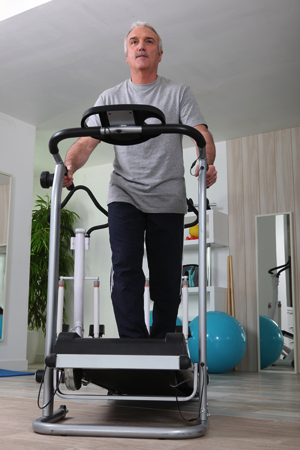Use exercise to reverse aging of your heart with Hashimoto’s hypothyroidism

Our muscles stiffen as we age, including the heart muscles. However, a new study showed that middle aged adults who took up moderate- to high-intensity exercise developed the heart flexibility of someone 15 to 20 years younger. High intensity interval training has also been shown to be so beneficial to overall health that it can help better manage autoimmune diseases such as Hashimotos hypothyroidism.
However, for the heart effects, there is a sweet spot in midlife for this to work — studies on 70-year-olds did not produce the same results.
Going into midlife with a sedentary lifestyle causes the heart to stiffen, shrink, and become less efficient at pumping blood and oxygenating the body. As a result, people develop shortness of breath, fatigue, edema, coughing, and other symptoms of heart disease.
This lack of oxygen to the body and brain also compromises overall health, which in turn can raise inflammation and make it hard to manage autoimmune disorders such as Hashimoto’s hypothyroidism.
For the two-year study, researchers tracked more than 50 volunteers who ranged in age from 45 to 64. They were healthy but sedentary. The participants were divided into two groups.
The first group did non-aerobic exercise three days a week, including basic yoga, balance training, and weight training.
The second group did moderate- to high-intensity aerobic exercise four days a week. Compared to the first group, this group saw dramatic improvements in their heart health.
Their hearts became noticeably more flexible and could process oxygen more efficiently. One researcher in the study said they were able to take a 50-year-old heart and turn back the clock to a 30- or 35-year-old heart.
These participants became stronger and fitter overall because their more flexible hearts were able to fill with more blood and pump more blood to the rest of their bodies during exercise.
You can imagine if you are working to manage Hashimoto’s hypothyroidism how a boost to your overall health and function could also help you manage your Hashimoto’s hypothyroidism. The group who did the non-aerobic exercise three days a week saw no change in their heart flexibility or efficiency.
Interval training is key to a healthier heart
The key to the study subjects’ dramatic heart health improvement wasn’t just aerobic exercise, but aerobic exercise that incorporates interval training — short bursts of high intensity with short rests in between.
Although there are many ways to do high-intensity intervals, the study subjects did “4X4” training: four minutes at 95 percent of maximum ability followed by three minutes of active recovery, done four times.
The magic lies in pushing the heart to near its maximum ability, which forces it to work harder and pump more blood.
However, the window for this magic apparently closes if you wait too long. People in their mid-forties to early sixties still have flexible enough heart tissue to effect dramatic results. Once you are older, your blood vessels may be too rigid.
Interval training excellent for Hashimoto’s hypothyroidism and brain health
People who take up interval aerobic training typically report overall increased well being and feeling happier.
When the brain receives more blood flow and oxygen from a healthier heart, its function improves too. Also, interval training releases a number of hormones and neurochemicals that boost brain performance, improve mood, and lower inflammation, which can help better manage Hashimoto’s hypothyroidism.
For instance, endorphins released during exercise not only make people feel happier, they also dampen inflammation.
High-intensity interval training also boosts brain-derived neurotropic factor (BDNF), a brain chemical necessary for the formation of memories and for learning and recall, important qualities to hang onto as we age.
People with sedentary lifestyles may feel daunted by the idea of high-intensity workouts. Luckily there are many options for guided workouts these days. For instance, Orange Theory Fitness is a chain of gyms around the country that show you your heart rate on a large monitor during guided workouts so you can learn what sort of exertion is required to get your heart rate up to its near maximum.
Although it’s important to push your heart, it’s also important not to overdo your exercise routines. Over exercising raises inflammation and can trigger or exacerbate chronic inflammatory or autoimmune conditions such as Hashimoto’s hypothyroidism. However, when you exercise within a healthy range, exercise has anti-inflammatory effects.
Ask my office for more advice on how we can help you manage your Hashimoto’s hypothyroidism with functional medicine principles.
15 Mar, 2018
Weight-Loss Information


0comments